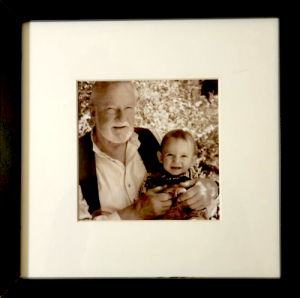Hospice Qualifies You for Respite Care
It isn’t what you think.
The hospice representative called to let me know that dad qualified for the program.
I told her, “I think we’re still okay to hold off.”
Two weeks later she called, “Do you want to rethink hospice care?”
I said no.
My dad’s dementia had become more severe, but he was still talking and eating well and he (mostly) knew who I was. That said, no one knows your person like you do. You can see how they are slipping away while others may not detect it.
It sounded so final to engage hospice.
We had no idea how quickly he would decline. Within two weeks, he was gone.

While I do my best to live my life without regrets, believing first to trust that things do not happen by chance, I wondered how his last days would have been different had we engaged hospice sooner.
Could I have been with him in those last moments? Would he have been more comfortable? Would my sister and brother and his grandchildren have been able to say good-bye?
A nurse would have visited him frequently, making sure he was comfortable. We would have had someone to call 24 hours a day, instead of the reluctant once-a-month visit from his doctor’s office. There would have been on-site medication oversight and administration. We would have truly known his condition.
People are either afraid of hospice or wish they’d engaged hospice earlier. I’d like to highlight a few of the facts here, particularly as it relates to dementia, and explain how hospice can support the caregiver with respite care.
Three points about hospice according to Medicare
- To qualify for hospice care, a hospice doctor and your doctor (if you have one) must certify that you’re terminally ill, meaning you have a life expectancy of 6 months or less.
- When you agree to hospice care, you’re agreeing to comfort care (palliative care) instead of care to cure the illness.
- You also must sign a statement choosing hospice care instead of other benefits Medicare covers to treat the terminal illness and related conditions.
One of the services hospice provides is respite care for the family caregiver.
Especially when caring for someone with dementia or Alzheimer’s, the mental, emotional and physical toll on the caregiver can be enormous, making respite for the caregiver essential.
Here are four things to know about respite care through hospice:
- Depending on the terminal illness and related conditions, the plan of care the hospice team creates can include inpatient respite care, which is care provided in a Medicare-approved facility (like an inpatient facility, hospital, or nursing home), so that the usual caregiver can rest.
- Your hospice provider will arrange this for you.
- Patient transport is included and you can stay up to 5 days each time you get respite care.
- You can get respite care more than once, but only on an occasional basis.
For more information about paying for care, check this video by Author Cameron Huddleston.
Dementia is a disease with no cure so it qualifies as terminal, which qualifies a dementia patient for hospice. But how then is life expectancy predicted?
Crossroads Hospice and Palliative Care, a private company serving a handful of states, mainly in the Eastern U.S., says this about eligibility. For patients with dementia, it may be time to consider hospice when the patient’s physical condition begins to decline. According to Crossroads, some key things to look for include:
- A diagnosis of other conditions as COPD, CHF, cancer or congenital heart disease
- An increase in hospitalizations, frequent visits to the doctor and/or trips to the ER
- A diagnosis or pneumonia or sepsis
- Weight loss or dehydration due to challenges in eating/drinking
- Speech limited to six words or less per day
- Difficult swallowing or choking on liquids or food
- Urinary and fecal incontinence
- Unable to sit upright without armrests on chairs or may slip out of chairs and require sitting in special chairs
- Unable to walk without assistance such as a walker or now requiring a wheelchair
- Unable to sit up without assistance (will slump over if not supported)
- No longer able to smile
Check the Hospice Foundation of America for what is included and not included in hospice care, how to choose a provider and how to begin the process.
This Sunday, June 13th marks the two year anniversary of my dad’s last breath on this earth. I’ll be taking off on a family road trip that day and thinking a lot about how much he loved to drive and explore and what an honor it was to call him daddio.
May you find joy in loving one another well.
Elizabeth Dameron-Drew is the Co-founder and President of Ways & Wane. She walked closely with her own father through his years of waning. She lives near Seattle with her two teenage sons, husband and two rescue dogs. When she’s not working on Ways & Wane she’s probably creating books, doing research work or planning a dinner party while listening to the rain and thinking about her next creative endeavor.
